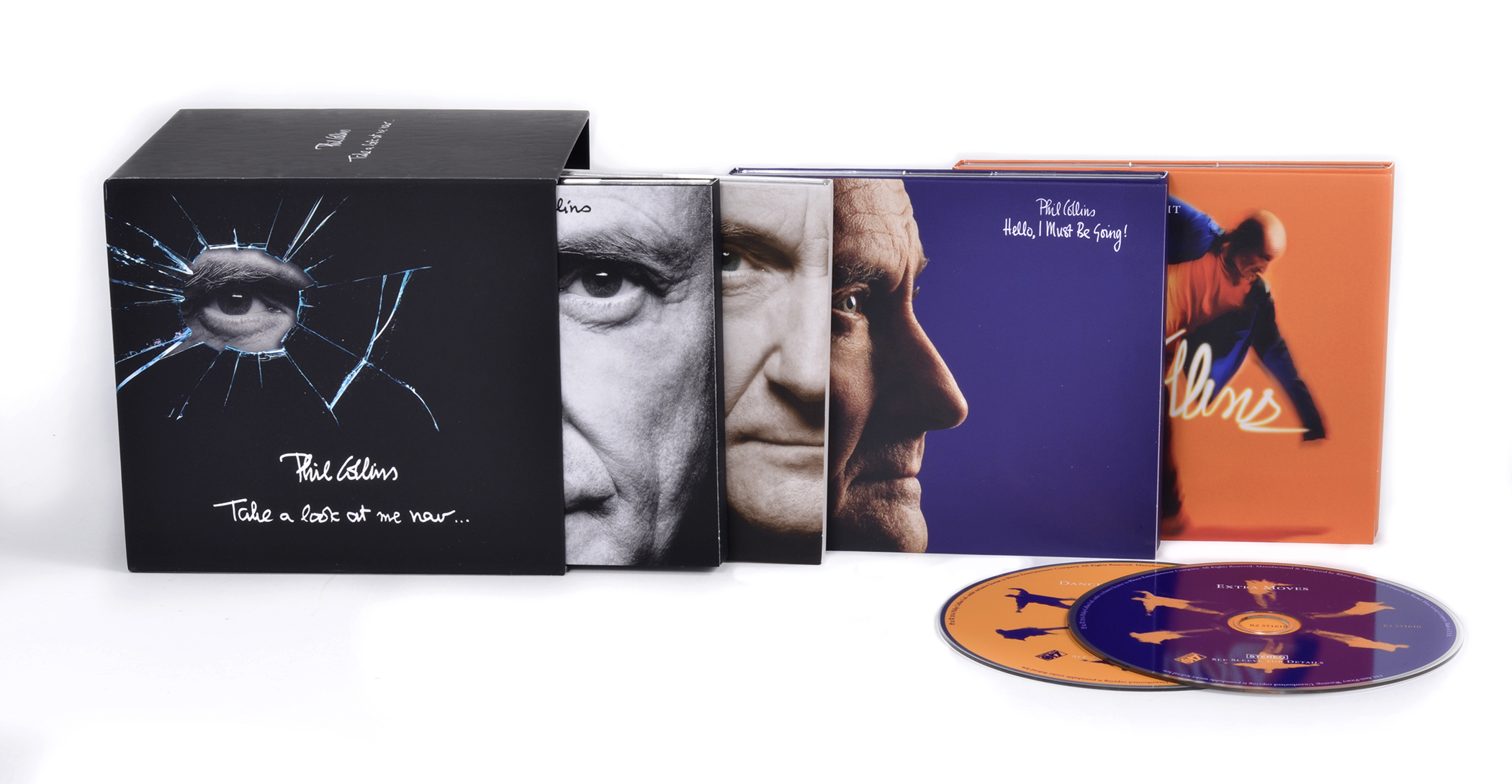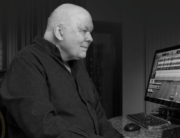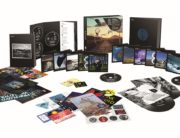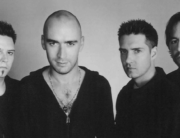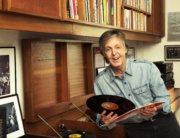BY MIKE METTLER – FEBRUARY 12, 2016
You can feel it coming, right around the 3-minute mark. The song has been building to an inevitability, courtesy of the track bed set by a Sequential Circuits Prophet-5 analog synthesizer, a Roland CR-78 Disco-2 drum machine, and some ominous, processed electric guitar riffs. A somber, Vocoder’ed vocalist intones, “The hurt doesn’t show, but pain still grows — it’s no stranger to you and me.”
And then Phil Collins lays into one of the heaviest badass drum breaks ever committed to record — the crowning moment of his first benchmark as a solo artist, “In the Air Tonight,” the lead track on his deeply personal debut album, 1981’s Face Value. (We’ll give you a moment to finish power-air drumming along to it.)
Collins’ naked, no-emotional-stone unturned style of songwriting has influenced a wide swath of artists ranging from Kanye West to Sleigh Bells. With his solo reissue series Take a Look at Me Now currently in full swing thanks to the dual salvo of 1981’s Face Value and 1993’s Both Sides (with 1982’s Hello, I Must Be Going and 1996’s Dance Into the Light to follow on February 26), Collins hopes to reach a new generation of listeners.
“The reason we’re doing this now is because people missed stuff,” he explains. “It’s an opportunity to rediscover these albums, or discover them for the first time. And also because of the newer, younger artists who list me as an influence, I think of the young kids who go, ‘Well, OK, who is this guy?’”
You can read my discussion with Phil about the sonic choices made for the reissue series, the most often overlooked innovation in the mix of “In the Air Tonight,” and how to truly work solo over on Digital Trends.
Now read on — here, in a SoundBard exclusive, Collins, 65, and I delve into his thoughts about surround sound, how he had to deal with sudden hearing loss, working with Sir George Martin, and loving The Beatles. I remember, don’t worry. . . worry. . . worry. . .
Mike Mettler: Throughout your career, there’s been a heritage of great sound quality, especially with your producer/engineer Nick Davis having done the entire Genesis catalog in surround sound [in DVD-A, DVD-V, and SACD]. Are you a fan of surround sound at all?
Phil Collins: Not really. I mean, I know [keyboardist] Tony Banks was very involved with it, working with Nick. But I do have to say, especially with the early stuff, the ’70s stuff — it’s staggering what a difference it makes.
 Mettler: So true. I’ve spoken to Tony Banks, Mike Rutherford, and Steve Hackett about it, and they all agree that the surround mix of “Supper’s Ready” [from 1972’s Foxtrot] is actually one of their favorite pieces of work.
Mettler: So true. I’ve spoken to Tony Banks, Mike Rutherford, and Steve Hackett about it, and they all agree that the surround mix of “Supper’s Ready” [from 1972’s Foxtrot] is actually one of their favorite pieces of work.
Collins: (nods) For those who’ve grown up with it, certainly it’s like watching a film in color after you’ve been used to it in black and white. I’m not talking about a colorized version, but literally you now see a version in color. But for me, I judge the performance. I’m not so much judging the sound, because I had this problem with my ear [points to left ear].
Mettler: Well, you’re in good company with Brian Wilson, who can only hear in mono.
Collins: I’m sure there are other people who have similar things. Sudden deafness is what they call it. The doctors don’t know what it is. It was a random infection, a viral infection, for no reason. I went to so many doctors and specialists, and they said, “Well, we don’t know much about it.”
If I had caught it early and taken the cortisone, it would have kickstarted the regeneration. But I left it too late, and my brain has adjusted.
When it first happened, I couldn’t listen to music at all. I was in Switzerland, in 2000. That’s why I did the final Genesis farewell tour [48 shows on the Turn It On Again Tour in 2007], because I was actually able to put those in-ear monitors in and sing on pitch.
Mettler: Stephen Stills deals with something similar. He’s practically deaf, and he uses [Oticon Dual hearing aids] as his own monitor system so that he can hear properly.
Collins: Yeah? I didn’t know that. There are so many different reasons under this big umbrella of hearing problems. Some people say it’s tinnitus, which is what [Pete] Townshend has. We’ve all got different things, but my thing is completely random. It just happened one day in L.A. when I was playing a video game with [his daughter] Lily. It came back once during dinner, and then it disappeared. It was like going underwater. The closest you can get is like when you’re in the shower and water gets in your ear, and [mimes trying to get it out]. God.

 Mettler: Well, I’m glad you’ve been able to adjust to it, and that you’re able to have worked on this reissue series. Let’s start with Face Value. Did you know it was going to have such an impact?
Mettler: Well, I’m glad you’ve been able to adjust to it, and that you’re able to have worked on this reissue series. Let’s start with Face Value. Did you know it was going to have such an impact?
Collins: We didn’t know at the time, but we thought it was good, obviously. There were different stages for it. I had my demos, and some of them are on there [points to the Extra Values bonus disc]. I did the demos over the period of a year, not knowing I was making an album. I was just filling my time, and writing songs for the ex [i.e., ex-wife Andrea Bertorelli] — messages.
Then I went up to London. In between writing my stuff, we [Genesis] were writing the Duke album. I went up to London to play the Duke album for [Atlantic Records founder/president] Ahmet Ertegun. We were great friends at that point, and he knew I had been going through some stuff. He said, “What have you been doing?” I said, “I’ve been writing,” and he wanted to listen to it. I had the cassette on me and we listened to it, and he said, “Wow! This has got to be a record!” And at that point, I knew it was a record.
Mettler: Before that, you weren’t really sure.
Collins: I didn’t know what to do with it. So after that, it was going to be a record.
Mettler: We also get the character of you as a player every time we hear you, no matter what the project is, or whoever you’re playing with. You’re able to adapt to what they want — and that’s not an easy thing to do.
Collins: No, in addition to having a signature, yeah. [Eric] Clapton, obviously, you know when it’s him, as you do with some others. Frankly, I’ve been playing all my life, so one would think that there’s a personality in it. But as you say, I adapt to whatever the person wants me to do, but you still hopefully tell it’s me, with or without the sound.
 I did a song for Tears for Fears called “Woman in Chains” [the lead track on their 1989 album The Seeds of Love]. I kind of knew Curt [Smith, TFF bassist/vocalist], and I’d met Roland [Orzabal, TFF songwriter/guitarist/vocalist] a few times. They got me in the studio, and they played a few things for me. They played me a Manu Katché track that was like the best of 25 drum tracks. He’d done it 25 times! What I took out of that was they had taken the time to take four bars out of there and these three bars out of here to compile a track. I thought, “My God, these guys are nitpickers!”
I did a song for Tears for Fears called “Woman in Chains” [the lead track on their 1989 album The Seeds of Love]. I kind of knew Curt [Smith, TFF bassist/vocalist], and I’d met Roland [Orzabal, TFF songwriter/guitarist/vocalist] a few times. They got me in the studio, and they played a few things for me. They played me a Manu Katché track that was like the best of 25 drum tracks. He’d done it 25 times! What I took out of that was they had taken the time to take four bars out of there and these three bars out of here to compile a track. I thought, “My God, these guys are nitpickers!”
When I go in, with me, it’s usually the first or second take. You either like it, or maybe I’m the wrong guy, you know? What they wanted was “In the Air Tonight.” They said, “We want a drum intro that’s like that.” I said, “I can’t do that, because I’ve done that!” Well, I did something, but I felt I hadn’t given them what they wanted. (chuckles)
Mettler: I think it actually turned out pretty well, all things considered. So, for listening to music when you were growing up, you had one of those big Grundig consoles with the lid that closed.
Collins: Yeah, yeah, I used to play drums with that behind me playing, so that I could play along to the records that I loved.
Mettler: Like to some of those early Beatles records, I’d imagine.
Collins: Yeah yeah, the whole ’60s thing was what I bought. I remember listening to Sgt. Pepper the day it came out [June 1, 1967]. Went out and bought it, came back, put it on, and I was looking at the cover. You lived and breathed it.
But I don’t listen to a lot of music now. When I’m making it, I’m listening to what I’m doing, and then my kids will turn me on to certain things because they’re playing it in the car. But I don’t put music on for pleasure too much.
Mettler: Well, you are a bit busy lately —
Collins: I am a bit busy, but I have a computer full of music. The other night, I had to listen to the live stuff from this [taps on the 2010 Going Back LP cover], because we’ve chosen the best stuff from the Roseland gig [on June 24, 2010], when we did it with the Funk Brothers. I was listening to it and I thought, “Wow, this is great! I’m really enjoying it.” And I went on to listen to a couple of different versions of things. But then I put on something completely different, because suddenly I got in the mood to listen to music. But normally speaking, I’m just getting along with daily life, like you just saw me do. (laughs)
Mettler: You’re also making sequencing decisions on the bonus discs, because sometimes you go from live tracks to demos back to live, or different versions — all of which are your own choices.
 Collins: Well, I am, but then they’ll be saying, “Well, what about this?” For example, yesterday, we were dealing with this album [points to vinyl version of Going Back]. We’re reissuing that one toward the end as the “essential” Going Back, which is a cut-down version. We’re going to issue what I think are the best songs. And also Roseland, as I mentioned, We’ve got a great CD of that, which has different songs. So that will be coming out later.
Collins: Well, I am, but then they’ll be saying, “Well, what about this?” For example, yesterday, we were dealing with this album [points to vinyl version of Going Back]. We’re reissuing that one toward the end as the “essential” Going Back, which is a cut-down version. We’re going to issue what I think are the best songs. And also Roseland, as I mentioned, We’ve got a great CD of that, which has different songs. So that will be coming out later.
Mettler: Do you have a personal favorite Genesis album? Can you say?
 Collins: I like We Can’t Dance (1991). There was a lot more me in that album lyrically. I wrote lyrics for about eight of those songs, which was unheard of. In Genesis, most of the lyrics were suggestions, ideas, or “what if” songs. They weren’t personal songs. But “Hold on My Heart” was all my lyric. I think by that point, the guys realized that I could do this.
Collins: I like We Can’t Dance (1991). There was a lot more me in that album lyrically. I wrote lyrics for about eight of those songs, which was unheard of. In Genesis, most of the lyrics were suggestions, ideas, or “what if” songs. They weren’t personal songs. But “Hold on My Heart” was all my lyric. I think by that point, the guys realized that I could do this.
Mettler: Well, you did have a little bit of solo success by then. . .
Collins: Yeah. In Genesis, we were great levelers. We didn’t let anybody get out of control. But I did have ideas, and I did delve into areas where I’d never been, like “Driving the Last Spike,” for example. I had read a book about the guys who’d built the railways [in the 19th century]. I’m really proud of that song, and “No Son of Mine.”

 Mettler: I also like the length of all those songs on We Can’t Dance. And I should point out there’s no song under 5 minutes long on Both Sides. But as a listener, you don’t really notice that because of the way they flow.
Mettler: I also like the length of all those songs on We Can’t Dance. And I should point out there’s no song under 5 minutes long on Both Sides. But as a listener, you don’t really notice that because of the way they flow.
Collins: I hadn’t thought of that. There’s no song under 5 minutes? Well, you know, I ramble on a bit. (both laugh) You milk the moment. You don’t even think of the possibilities of this being a single or that being a single.
Mettler: One more question, before we roll: Beatles — mono or stereo for you?
Collins: You know, I’ve got all of it on my computer. I haven’t gotten ’round to listening to it properly, but I’m always interested. I listened to the stereo version of Sgt. Pepper when it came out originally, and it was fascinating. I know mono was what they mixed it for and they spent very little time with the stereo. But the idea that you could cut off that speaker and hear [Paul] McCartney’s bass, and a tambourine… (smiles)
I went into the studio with George Martin, when he was doing the interim CDs [the Anthology series]. I did an interview with him for a show that never happened called We Need His Ears. He was putting stuff onto digital tape and I said, “Oh, can I come up and listen to it?” I went up the Air Studios, and he showed me — he had “Ticket to Ride,” and “Yesterday,” and “Help,” a few songs he was doing. And he put up, [coughs] “ahem, ahem” [air drums] “chicka chicka chicka” — so fantastic to hear that! [Mimes intro to “Ticket to Ride”] Ding ding ding-ding, ding ding ding-ding. . .
Mettler: I love that. I think it’s fascinating hearing how all of that was put together. And you did “The Medley” [i.e., “Golden Slumbers,” “Carry That Weight,” “The End”] on Sir George’s album, In My Life (1998).
 Collins: Yeah, that was great. I was doing Dance Into the Light, and he came over to France, where I was working. I really got to know him — lovely man, lovely man. We sat down, and he played me the backing track he’d already made, and I played drums along to it. We made that Ringo break [during “The End”] longer. He said, “This is John’s part.” So I sang John [Lennon’s] part. He said, “This is what George [Harrison] did.” And it was fantastic fun to build this thing with the person who actually did it the first time ’round.
Collins: Yeah, that was great. I was doing Dance Into the Light, and he came over to France, where I was working. I really got to know him — lovely man, lovely man. We sat down, and he played me the backing track he’d already made, and I played drums along to it. We made that Ringo break [during “The End”] longer. He said, “This is John’s part.” So I sang John [Lennon’s] part. He said, “This is what George [Harrison] did.” And it was fantastic fun to build this thing with the person who actually did it the first time ’round.
Mettler: And on Face Value, the ending with your cover of The Beatles’ “Tomorrow Never Knows” with “Over the Rainbow” added a cappella at the end of it, is still a nice touch.
Collins: It was at the Village Recorder in L.A., in this big live room. I was doing something in there, and I was singing, “Somewhere, over the rainbow. . .” I really loved the sound of it, so I said to Hugh [Padgham, producer], “Record it!” But I didn’t know all the words. So I asked Jill [Tavelman], my girlfriend at the time who became Mrs. Collins #2 – her mom knew the guy who wrote it [Yip Harburg, who died in March 1981]. (chuckles)
So I called her, her mother called the guy who wrote it, I wrote down the lyrics, and I sang them. Everybody only knows certain lyrics, but not all of them. And we just plonked it at the end of “Tomorrow Never Knows,” because it was the end of the album, and it fitted. (pauses) That was a special moment to have.

